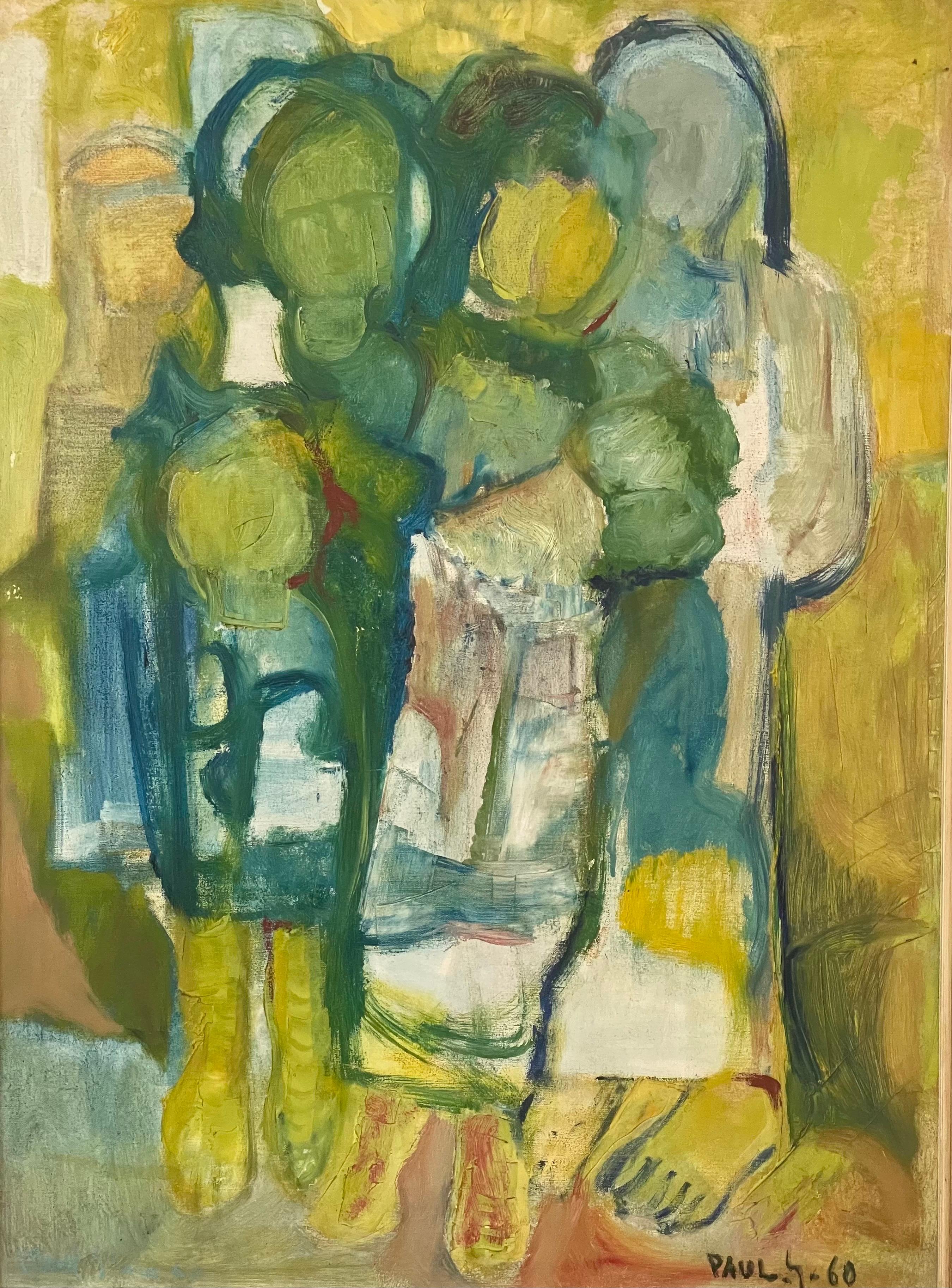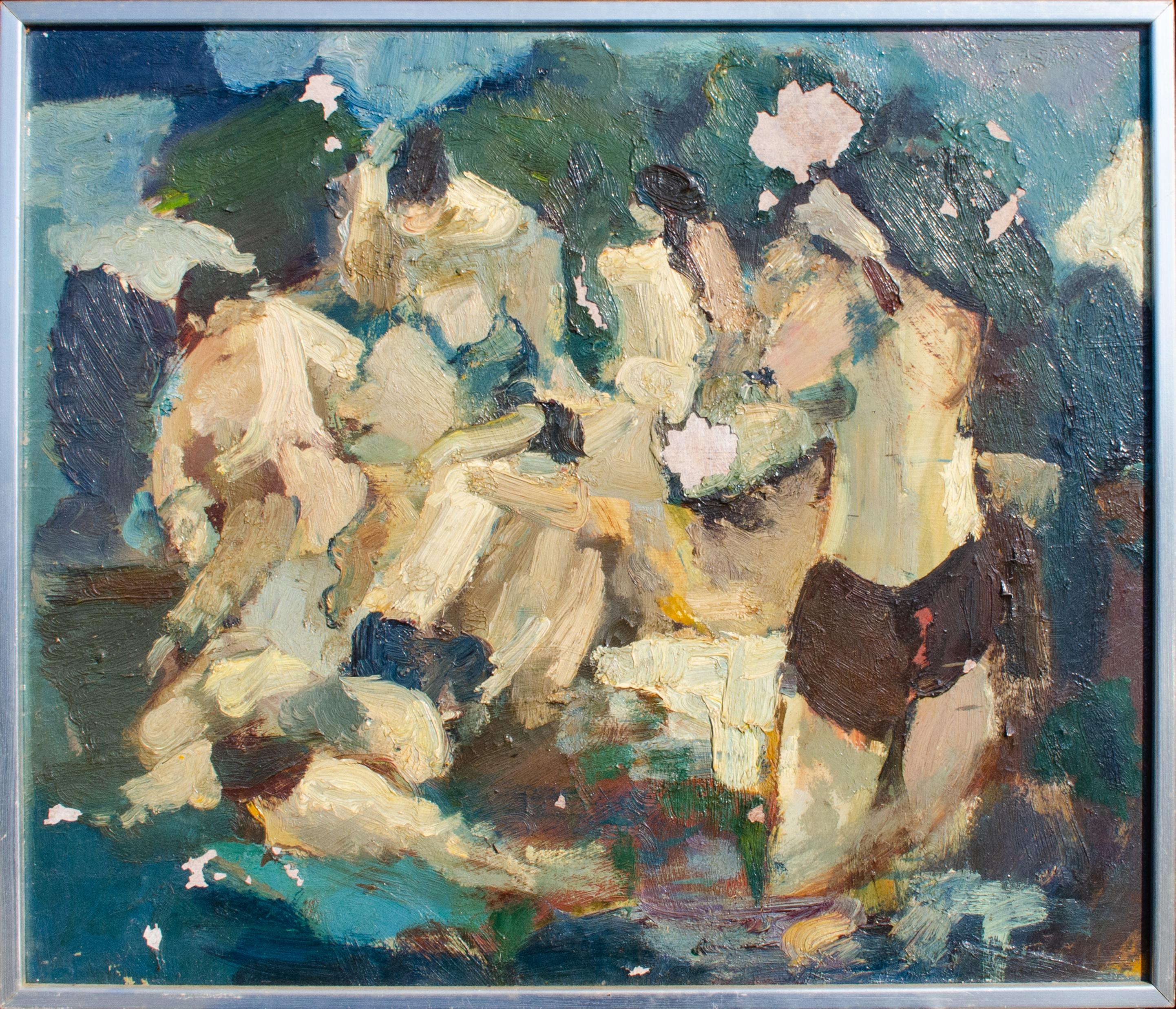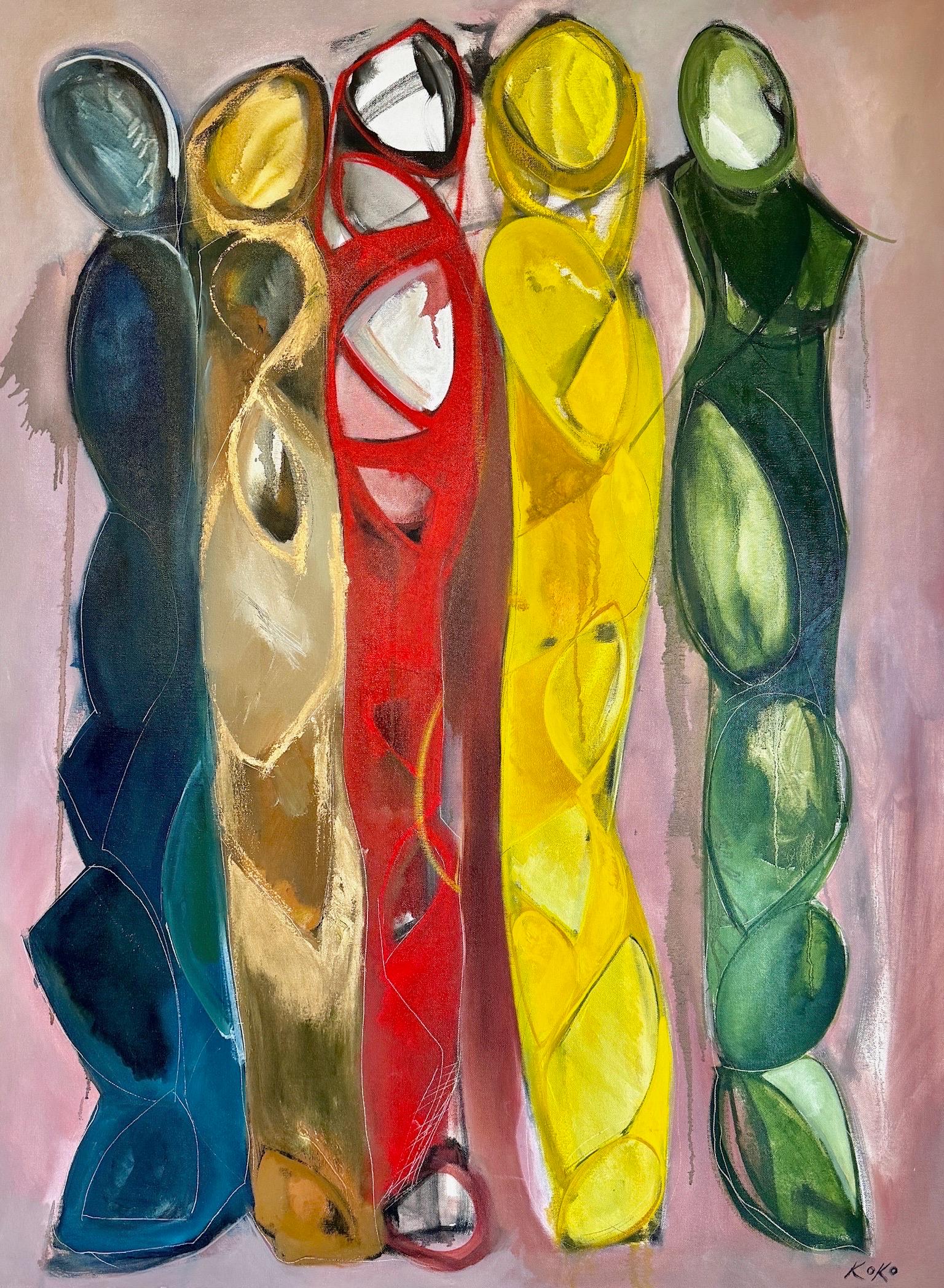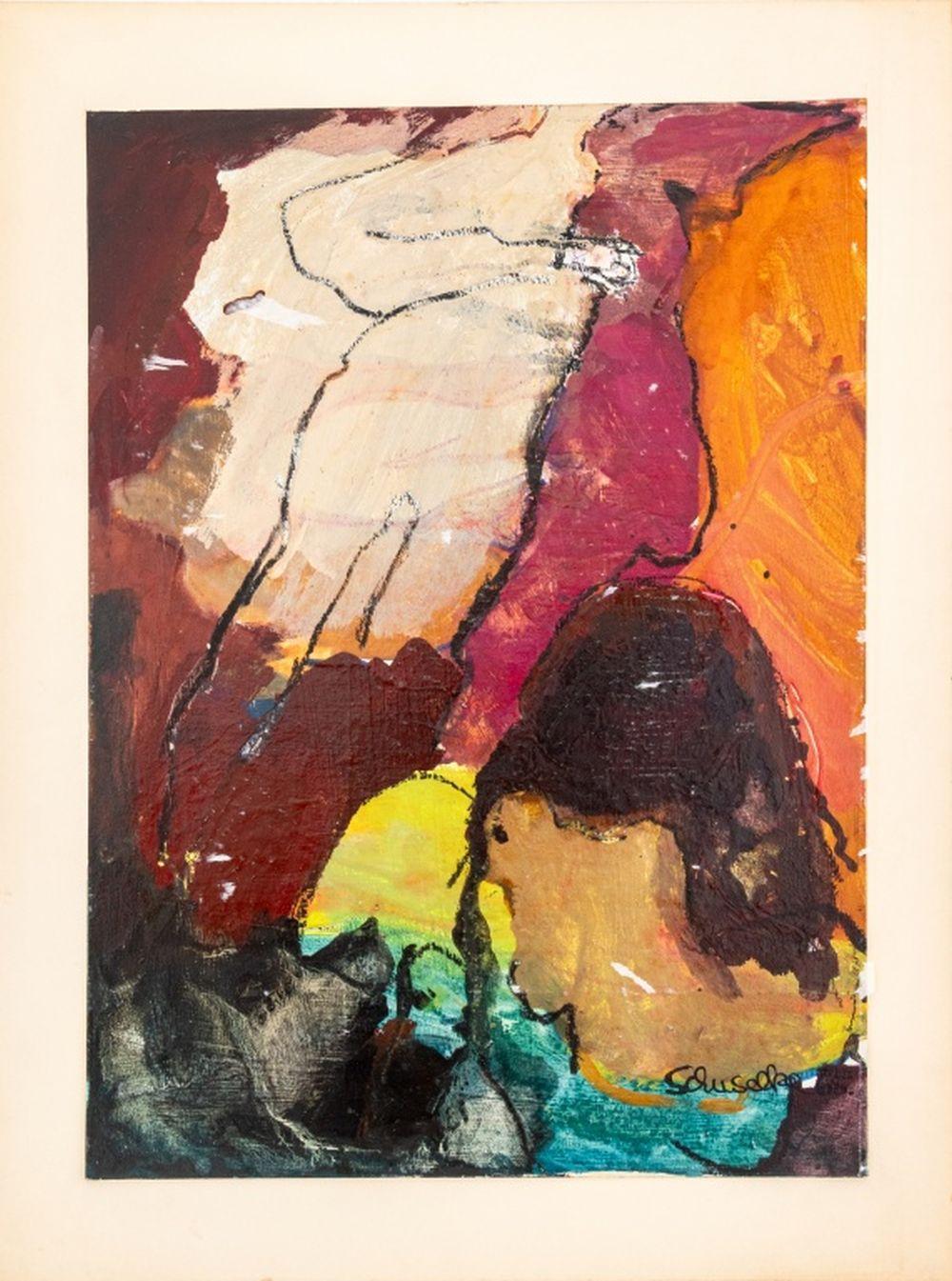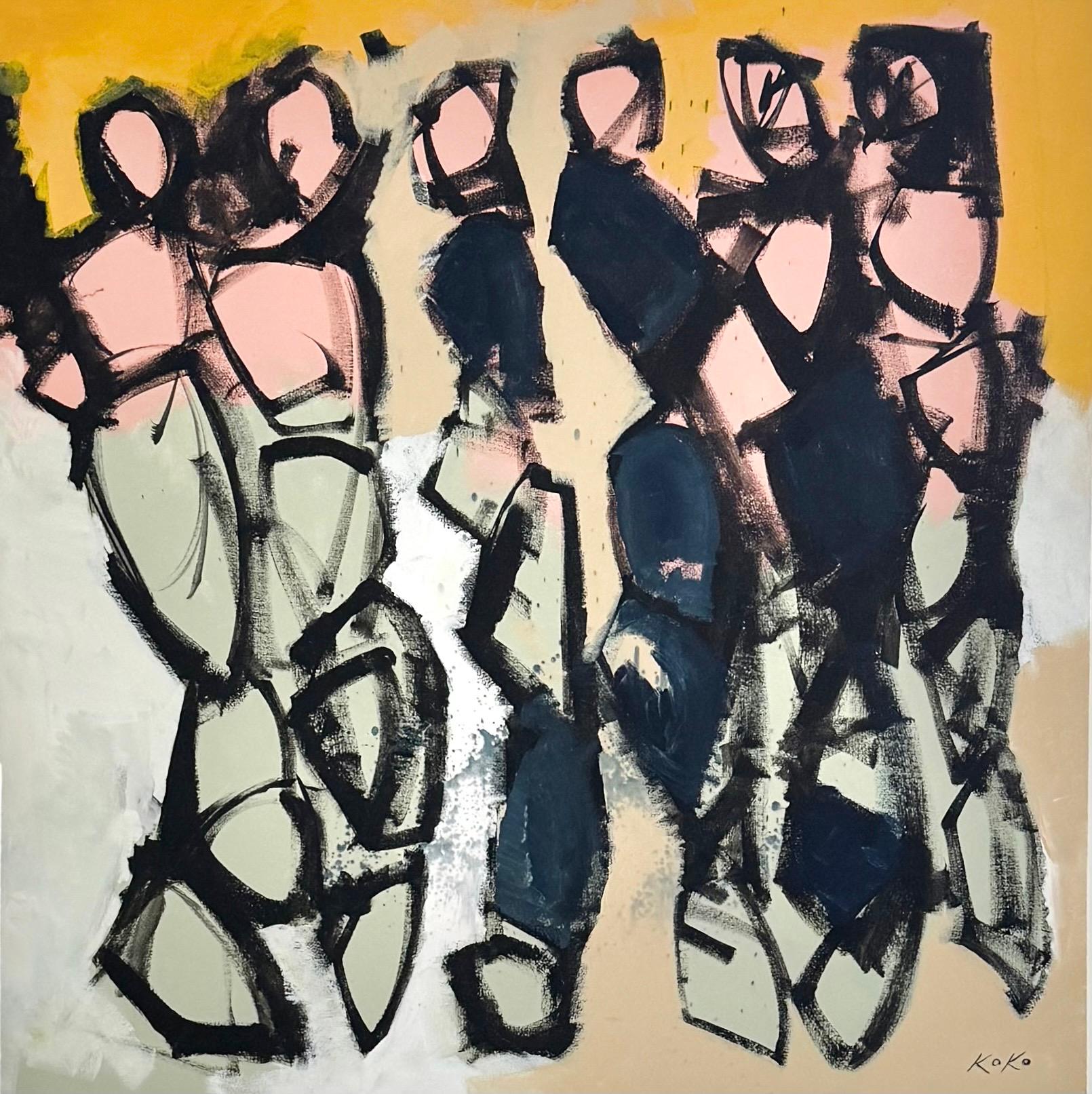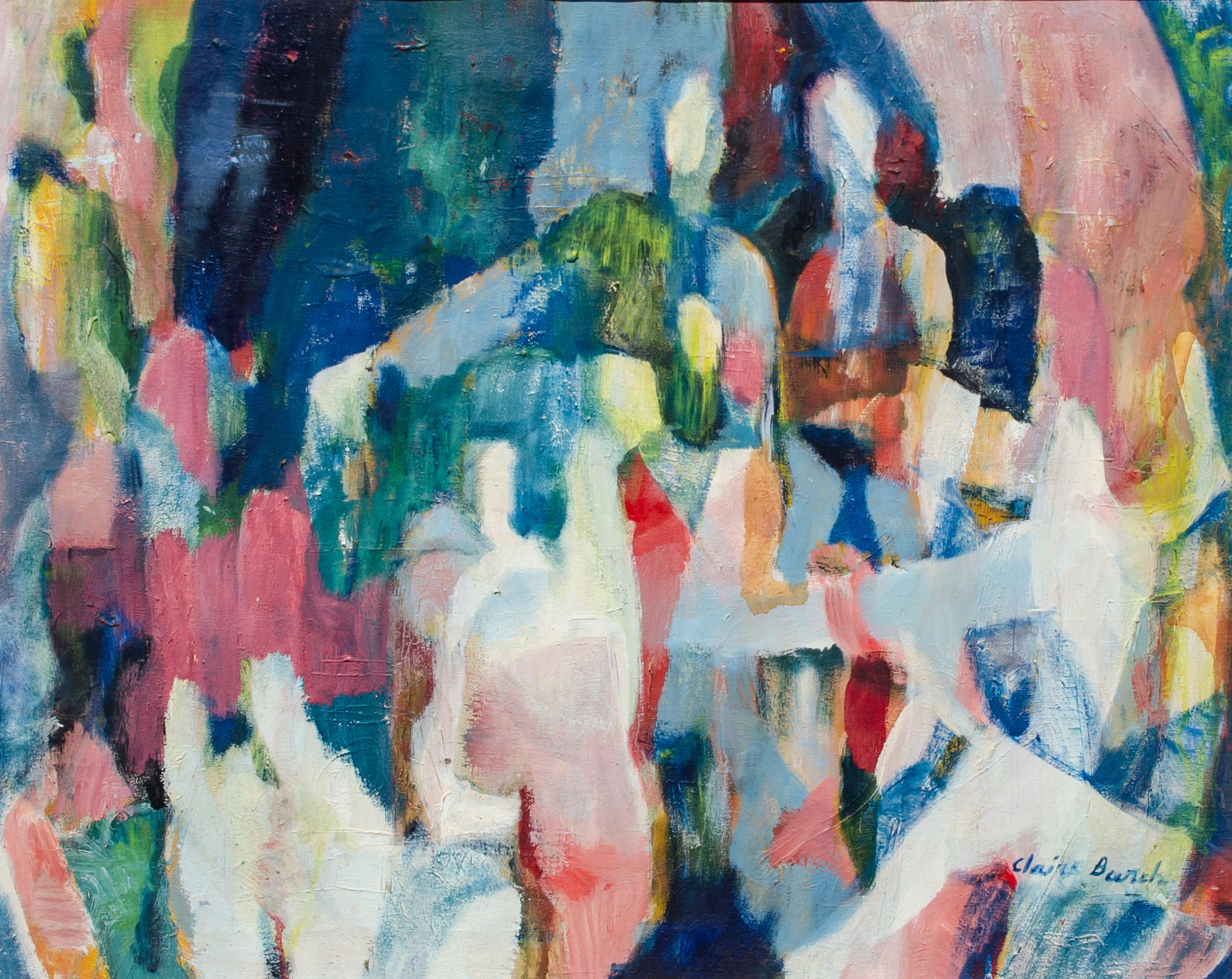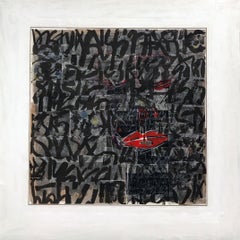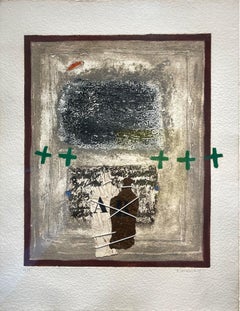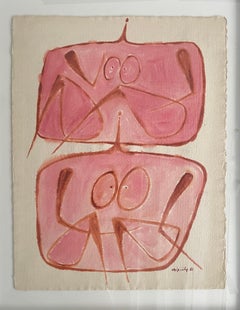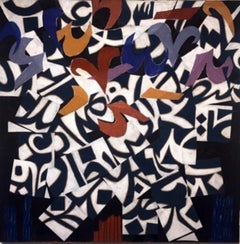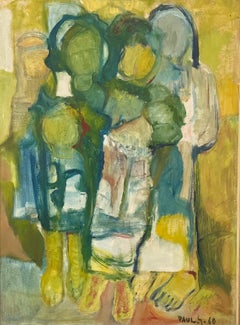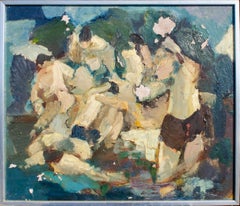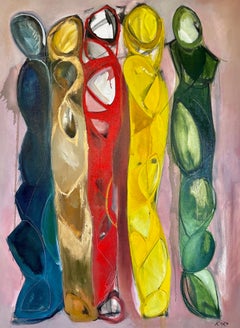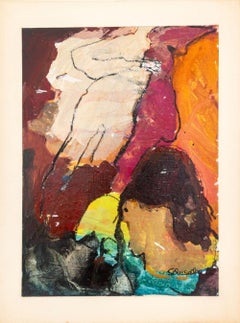Items Similar to Retrouvailles
Want more images or videos?
Request additional images or videos from the seller
1 of 5
Paul GuiragossianRetrouvailles1983
1983
$70,471.35
£53,802.34
€60,000
CA$99,500.48
A$109,189.37
CHF 57,030.14
MX$1,305,480.18
NOK 722,387.74
SEK 673,762.50
DKK 457,078.25
About the Item
Unique artwork by Paul Guragossian
Signed lower left
Born to Armenian parents, who were survivors of the Armenian genocide, Paul Guiragossian experienced the consequences of exile from a very tender age. Raised in boarding schools, he grew up away from his mother who had to work to make sure her two sons received an education.
In the early 1940s, Guiragossian and his family moved to Jaffa where he attended Studio Yarkon (1944 - 1945) to start improving his passion for painting. In 1947, the family moved again and settled in Lebanon.
In the 1950s, Guiragossian started teaching art in several Armenian schools and worked as an illustrator. He later started his own business with his brother Antoine where they painted cinema banners, posters, and drawing illustrations for books. Soon after he was discovered for his art and introduced to his contemporaries after which he began exhibiting his works in Beirut and eventually all over the world.
In 1956, Guiragossian won the first prize in a painting competition, which landed him a scholarship by the Italian government to study at the Accademia di Belle Arti di Firenze (The Academy of Fine Arts of Florence). While in Florence, he had multiple exhibitions starting with a solo show in 1958 at the Galeria D'Arte Moderna "La Permanente".
In 1961, Guiragossian returned to Beirut.[1] In 1962, Guiragossian was granted another scholarship, this time by the French Government, to study and paint in Paris at Les Atelier Des Maîtres De L'Ecole De Paris and by the end of that year he had a solo exhibition at the Galerie Mouffe.
By the mid 1960s, Guiragossian had grown to become one of the most celebrated artists in Lebanon and eventually of the Arab world. Even when war broke out in the early 1970s, his attachment to Lebanon grew bigger and his works became more colorful with messages of hope for his people.
In 1989, Guiragossian went to Paris to exhibit his works in La Salle Des Pas Perdus in UNESCO and lived in the city with part of his family until 1991. In that year, he had a solo exhibition at the Institut du Monde Arabe. This exhibition was extended and marked the first solo show at the IMA for any artist.
Guiragossian died on November 20, 1993, in Beirut. That morning after completing a magnificent oil painting, he revealed to his daughter that he finally achieved what he always wanted, merging the old and the new in one painting.
The family agreed to title the painting "L'Adieu" and it remains unsigned in the Guiragossian family collection. His work can be found in the National Gallery of Armenia.[2]
- Creator:Paul Guiragossian (1925 - 1993, Armenian, Lebanese)
- Creation Year:1983
- Dimensions:Height: 23.63 in (60 cm)Width: 28.75 in (73 cm)Depth: 1.58 in (4 cm)
- Medium:
- Movement & Style:
- Period:
- Condition:
- Gallery Location:PARIS, FR
- Reference Number:1stDibs: LU2506213360022
About the Seller
No Reviews Yet
Vetted Professional Seller
Every seller passes strict standards for authenticity and reliability
1stDibs seller since 2023
6 sales on 1stDibs
- ShippingRetrieving quote...Shipping from: PARIS, France
- Return Policy
More From This Seller
View AllUntitled
Located in PARIS, FR
George Merheb was born in Lebanon in 1960 where he currently works and resides. He obtained a Master’s degree in Drawing and Painting from the Lebanese University of Beirut, Lebanon....
Category
2010s Abstract Paintings
Materials
Acrylic, Mixed Media
$5,500
Les Jumeaux de Virginie
By James Coignard
Located in PARIS, FR
French painter, sculptor, engraver, James Coignard was born in Tours in 1925. He lived and worked in Antibes, in the Maritime Alps, and he died in March 2008.
Coignard began his studies in 1948 at the School of Fine Arts in Nice; however, his journey as an artist began in the Côte d'Azur, where he settled. In fact, Coignard traveled a lot, living for a period from 1985 to 1988 in New Orleans. His artistic career was marked by collective and personal exhibitions both in France and abroad (Sweden, Switzerland, the United States...), where he enjoyed fame and recognition.
Until the 1960s, his artistic development was characterized by an expressionistic style; then Coignard found himself moving towards an abstract one with random spots, regular shapes, typographical characters, and mixed media backgrounds.
He was a painter but also a sculptor, who experimented with bronze and with glass. His work as an engraver was also quite well-known.
James Coignard created his first glass sculpture in the 1970s at the Fucina degli Angeli. Only later, after meeting Adriano Berengo...
Category
1970s Abstract Abstract Paintings
Materials
Etching
DESSIN
Located in PARIS, FR
Philippe Hiquily's original drawings from the early 1960s, housed in a private collection, are a distinctive showcase of the provocative Hiquilian style that defined this era. These ...
Category
1960s Contemporary Abstract Drawings and Watercolors
Materials
Watercolor
$11,157
Untitled
Located in PARIS, FR
George Merheb was born in Lebanon in 1960 where he currently works and resides. He obtained a Master’s degree in Drawing and Painting from the Lebanese University of Beirut, Lebanon....
Category
2010s Abstract Paintings
Materials
Mixed Media
$12,000
Abstract Strokes
Located in PARIS, FR
George Merheb was born in 1960. He obtained a Master’s degree in Drawing and Painting from the Lebanese University of Beirut, Lebanon. Merheb completed a number of specialized course...
Category
2010s Abstract Paintings
Materials
Mixed Media
Untitled
Located in PARIS, FR
Helen Khal grew up in a Lebanese family in Pennsylvania. In 1946, she went to live in Lebanon for two years, studying painting at the Lebanese Academy of Fine Arts in Beirut, and meeting the artists Shafic Abboud...
Category
1970s Abstract Paintings
Materials
Oil
$13,000
You May Also Like
Contemporary art, the family, figures, Paul Guiragossian.
By Paul Guiragossian
Located in La Canada Flintridge, CA
Here is one of Paul Guiragossian's 1960s oil paintings on canvas. The artwork's size, without the frame, is 31 x 23 inches. The overall composition represents a family, with the figu...
Category
1960s Abstract Expressionist Figurative Paintings
Materials
Oil
Gorgeous Abstract Expressionist Figures by Syril Frank
Located in New York, NY
Syril Frank (American, 1929-2021)
Untitled, c. 1970s/80s
Oil on canvas
Framed: 21 3/4 x 25 2/3 x 1 in.
This fantastic painting in the abstract expressionist style loosely depicts a ...
Category
Late 20th Century Abstract Expressionist Abstract Paintings
Materials
Canvas, Oil
Contemporary figures, Vignettes, Abstract figures.
Located in La Canada Flintridge, CA
it is oil on canvas and artist Koko sighed lower right.
Category
2010s Abstract Expressionist Figurative Paintings
Materials
Oil
Abstract Figural Composition
Located in Astoria, NY
Elfi Schuselka (Austrian, b. 1940), Abstract Figural Composition, Mixed Media on Board, 1965, signed and dated lower right, signed and stamped "Studio / Elfi Schuselka" to verso. Ima...
Category
1960s Abstract Figurative Paintings
Materials
Paint, Mixed Media, Board
Figures Language
By KOKO HOVAGUIMIAN
Located in La Canada Flintridge, CA
Artist certificate will be included with the painting. It is on canvas and signed lower right.
Category
2010s Abstract Expressionist Figurative Paintings
Materials
Oil
Vibrant Modernist Abstraction by Claire Burch
Located in New York, NY
Claire Burch (American, 1925-2009)
Untitled, 20th century
Oil on canvas
24 x 30 in.
Framed: 31 2/3 x 37 3/4 x 1 1/2 in.
Signed lower right: Claire Burch
After attending grade school in Brooklyn, Burch completed a commercial art course at Washington Irving High School in Manhattan and received her B.A. in English from NYU. In the suburbs of Great Neck, New York, she first began writing poetry and articles which were published in Life magazine, The New Republic, Mademoiselle, McCall's, Saturday Review, Redbook, Good Housekeeping, and numerous literary quarterlies and anthologies.[1] Burch also developed a career as a psychiatric writer, publishing two books on the subject: Careers in Psychiatry and Stranger in the Family.
In the early 1970s Burch became a playwright and painter. Her play Ten Cents a Dance was optioned to be directed by José Quintero, the famous O'Neill interpreter. Burch wrote a total of seven plays and several folk operas, but eventually moved on to filmmaking and video anthropology—she was an early adapter of video as a medium.
In 1978, Burch moved to California with her longtime companion Mark Weiman, publisher and owner of Berkeley's Regent Press. She had endured a series of illnesses and wanted to escape the harsh climate of Manhattan.
Burch gained insight and inspiration from insanity and the often unexpected behavior associated with it. She would often videotape homeless people in People's Park and Telegraph Avenue in Berkeley, which were collected in her film People's Park in Berkeley: Then and Now. The film documented the dispute between homeless activists and the University of California from the riots of 1969 through 1996 by interviewing park "regulars," and profiling the events surrounding the deaths of park supporters James Rector and Rosebud Denovo.[2]
She also produced documentaries on noted cultural figures such as James Baldwin (whom she knew as a teenager), Timothy Leary and Country Joe McDonald. Also of note was Oracle Rising, a film about the legendary psychedelic newspaper The SF Oracle published in the Haight-Ashbury district during the Summer of Love. Her last completed film was Elegy for the Naked Guy...
Category
20th Century Abstract Expressionist Abstract Paintings
Materials
Canvas, Oil
More Ways To Browse
Paul Guiragossian
Tutu Vintage
Two Men Painting
Woman Floating
19 C Oil Painting Of Children
Astronaut Art
Nurse Art
Player Pianos Used
17th Century Paintings Peter Paul Rubens
Cowboy Portrait
Flute Painting
Ice Skater Art
Ice Skating Art
Mexican Church
Skull Oil Painting
Confused Paintings
European Masters Paintings
Feast Painting
